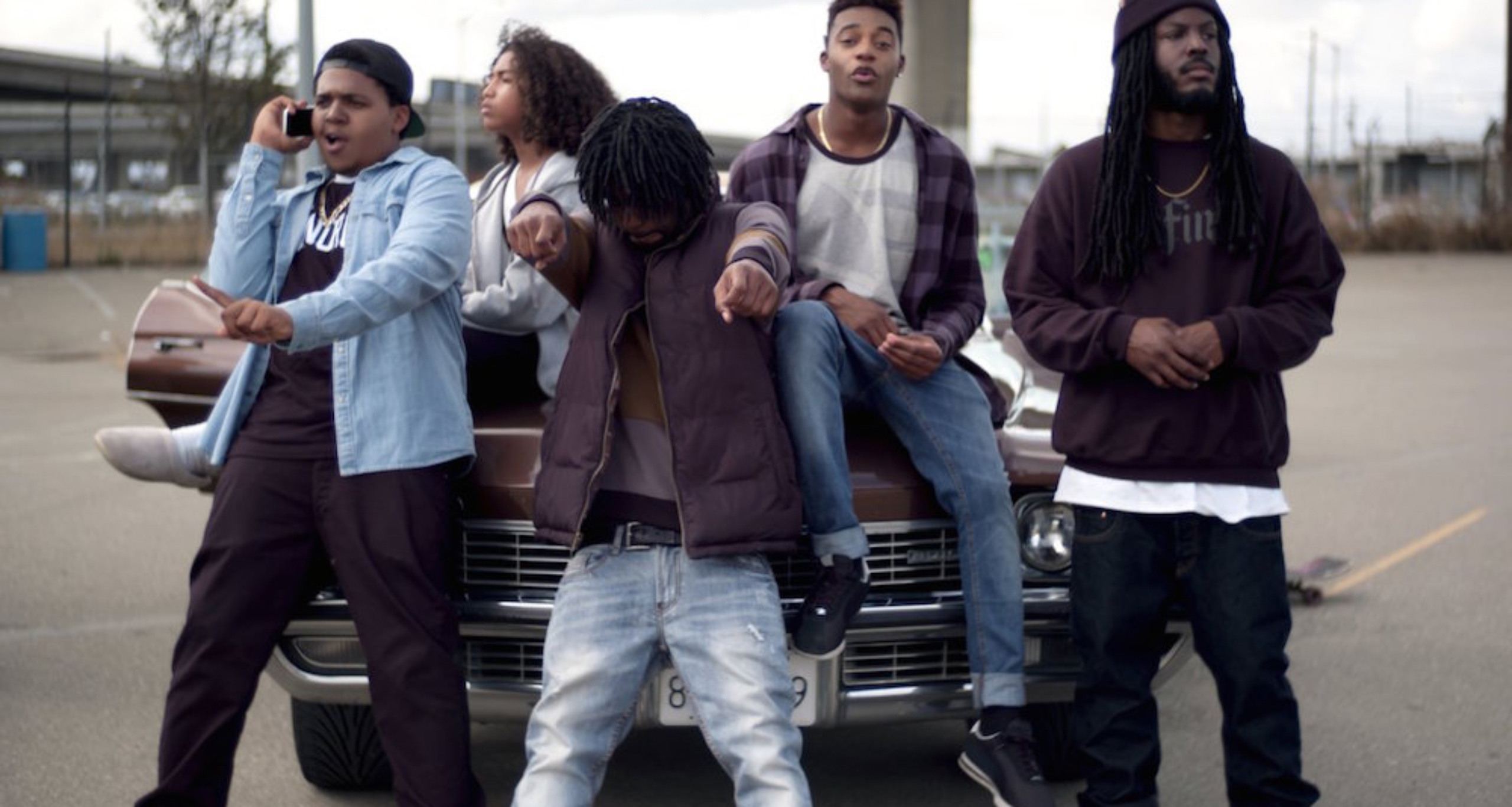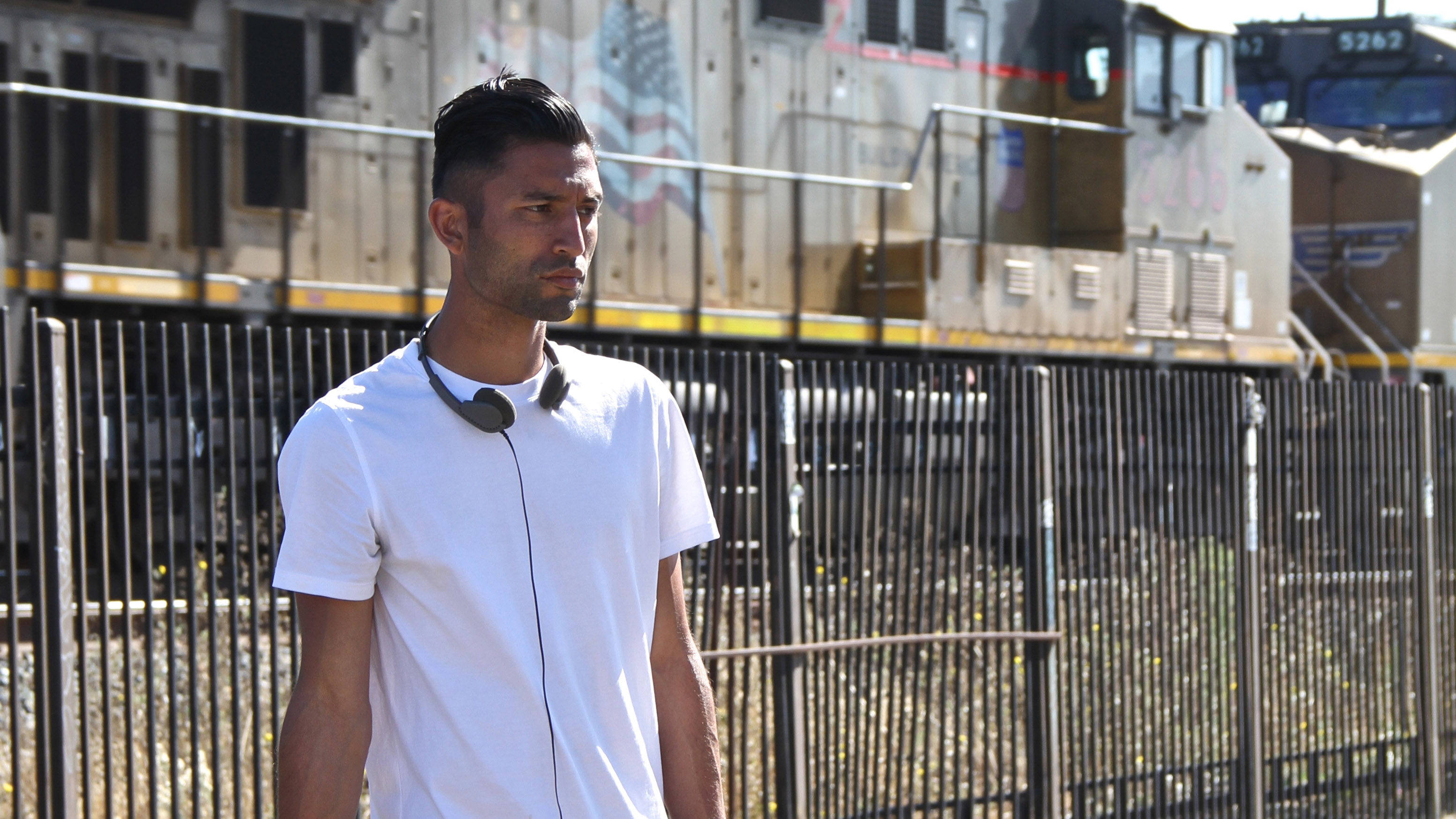Justin Tipping and I hadn’t been talking about his feature-film debut Kicks for more than five minutes when the call dropped. Those moments are always awkward because really, you know right away that things have come to a grinding halt, but you still offer a measly “Hello?” into the receiver. And if you’re me, you launch into a spirited conversation just to make absolutely sure (it’s preferable to hanging up on your subject, after all). Once I confirmed my fears and we touched base again, I practiced the art of being smooth while Justin moved into “better reception.” Both actions were foolproof.
Having attended graduate school with Justin, I knew him—but I didn’t know him. My memories are characterized by his positive disposition and laser focus when it came to filmmaking, two qualities which appear to have served him well in recent years. Those artists who fall on the quieter side (as Justin does) are often the ones who emerge with accomplished projects before you even knew they had stumbled upon the gem of an idea. They don’t talk your ear off about it; they simply make their film.
The story of Kicks, which is available for digital download today, follows fifteen-year-old Brandon (newcomer Jahking Guillory) who finally gets his hands on a new pair of Air Jordans—only to be jumped by a local gang in Oakland. Of course, he’s not going to let them get away that easily. What’s so interesting about the film is that it examines the pitfalls of a very specific cultural phenomenon—sneakers—but it does so in a way that welcomes outsiders instead of alienating them. If you walk into the theater armed with the firm belief that kicks are just regular shoes, you won’t struggle to grasp any character motivations. Nor will the film shove anything down your throat.
As we chatted, Justin maintained the perfect balance of childlike wonder at the realization that he’s actually made a film that’s in theaters and the maturity that comes with seasoned filmmakers who speak confidently about their craft and direction in life.
You trained as a directing fellow at the American Film Institute Conservatory and made a number of short films, including a short version of Kicks. Can you talk about how you expanded it into a feature?
It was a really great thing that I did the short before going into the feature, because it taught me a lot of lessons about what worked and what didn’t, and it revealed what I wanted to say thematically. After that short, [co-writer] Joshua Beirne-Golden came on board and we talked through everything—how it could be shaped and developed. It took us about a year to finish that first draft, and then once we’d premiered our other short film, Nani, the feature script of Kicks was ready to go. When we started going on meetings and talking about the film, I quickly realized that I had a coming-of-age movie that was rated R, with [a cast that was] all people of color! So throughout the next year it was an uphill battle of finding at least twenty independent financiers to give a little piece of the money here and there. That’s how it came to fruition.
“The emotional impetus is actually not the fact that I got jumped and beaten by those kids, but really the humiliation that followed.”
Growing up in the Bay Area, did you have experiences with neighborhood kids who would resort to violence over a pair of shoes?
Yes, actually this incident [from the film] happened to me. I was sixteen and I thought I was super cool because I’d just bought these new white Nike sneakers, and I was on my way to see a movie and meet my friends. I was in this parking lot, and the first thing I heard was, “He’s got the Nikes!” From that moment, I knew it was downhill from there.
But the emotional impetus when talking about this is actually not the fact that I got jumped and beaten by those kids, but really the humiliation that followed—reactions from peers making fun of the incident and asking if I got a hit in. At the same time, my older brother told me that I’d become a man. So I became interested in exploring how these hyper-masculine ideas feed the cycle of violence that gets perpetuated in our society. Gun violence is obviously a huge problem in America, but especially in the Bay Area; I knew a lot of kids at school who had been personally affected by it. In fact, many of the kids we cast in the film had lost friends or personal property due to nonsensical gun violence.
https://www.youtube.com/watch?v=qfj210YNKfU
Let’s dive into sneaker culture. Can you talk about what a new pair of sneakers represents in the world you portray in Kicks?
Sneakers, and especially the Air Jordan, are a social signifier of status and respect. On a universal level the same things exist in capitalism; think of a Porsche in Beverly Hills. There are these weird hierarchies of status symbols, and specifically for the kid in Kicks, their community has gone through oppression and there isn’t equal opportunity, so wearing sneakers is akin to wearing a Porsche or a Rolex on your feet. It’s something obtainable.
What’s crazy is that I got jumped in 2001, had the concept for Kicks in 2009, wrote the script in 2012, and here we are now in 2016, and it’s almost gotten worse because there’s a billion-dollar resale industry of buying exclusive sneakers. Kids are selling them and they’re appreciating, so they’re basically pieces of art. That makes it even more dangerous when you’re out in the world with them.
We should be addressing why kids think it’s totally fine and appropriate to steal shoes, as if it somehow validates their manliness. People who didn’t grow up in that culture find it hard to understand, like: why even buy shoes in the first place? But the Air Jordan is a symbol that represents hip-hop, fashion, and hopes and dreams. For a kid who feels like they have no voice in the world, Jordan represents that wish fulfillment, because Michael Jordan was once a kid who got cut from a basketball team, and now he’s the most famous athlete in the world. Owning that does make you feel empowered; it’s a way to express who you are or who you want to be.

courtesy of Focus World
Can you talk about the casting process for the film, and how you found the fresh face of Jahking Guillory for the lead?
We knew from the beginning that it was going to be a mix of experienced actors and non-professional actors, so we worked with a casting director in Los Angeles, Kimberly Hardin. She’d done Hustle & Flow and was working with John Singleton at the time, which was a trip because I got to meet him. We saw hundreds of kids in LA, and we found our lead through Kim. Jahking had never really done any acting before, but his claim to fame was that he was on Snoop Dogg’s football team in Long Beach. He totally understood the material even though he was only thirteen when we shot the film. The story really called for a prepubescent kid who wasn’t as grown up as his two best friends, so it really worked.
“The Air Jordan is a symbol that represents hip-hop, fashion, and hopes and dreams. For a kid who feels like they have no voice in the world, Jordan represents that wish fulfillment.”
Then Christopher Meyer, who plays Rico, [had] done a few roles on television. Christopher Jordan Wallace was in a Will Ferrell movie [Everything Must Go] when he was about twelve. He’s actually the son of Biggie Smalls, which is crazy. But he’s the most humble kid out of all the kids. Mahershala Ali got involved because he’s from the Bay Area as well; he saw the script and said he wanted to do it. Kofi Siriboe was the only other experienced actor; he’d had had a role in Whiplash, and now of course he’s blowing up on Queen Sugar. For some of the neighborhood boys, Josh and I would literally walk up to kids in Richmond and ask them if they wanted to be in a movie. I think a lot of people didn’t think it was going to be a real movie, but that’s how we found everyone else. They were real kids from the neighborhood.
Have you screened the film to real kids from those neighborhoods?
Yes, and that was one of the most rewarding things. Ultimately when you make a story you try to find those universal themes that summon nostalgia or encourage people to feel a certain way, and I really wanted to show the film to other young men or boys who might be going through a similar experience in their lives. I went to this opening night in Oakland, and the six-hundred-seat theater was sold out. I sat through it in the middle of the audience, and there were teenagers from Oakland who cheered when Flaco got hit in the face—then the room would fall quiet again. Hearing that reaction was wonderful, and afterwards I got to stay and talk to everybody. The amount of people who said “Thank you, this is the first time I’ve seen my neighborhood on screen in a theater” was amazing. I had fathers come up to me who were raising their kids in Oakland, and they said things like, “This is actually what happens [here] and I’m glad you told this story, so now I can talk to my son about it.” That’s when it’s like wow—this is why we do it. That’s why I wanted to make the film, and those moments are really special to me. FL







